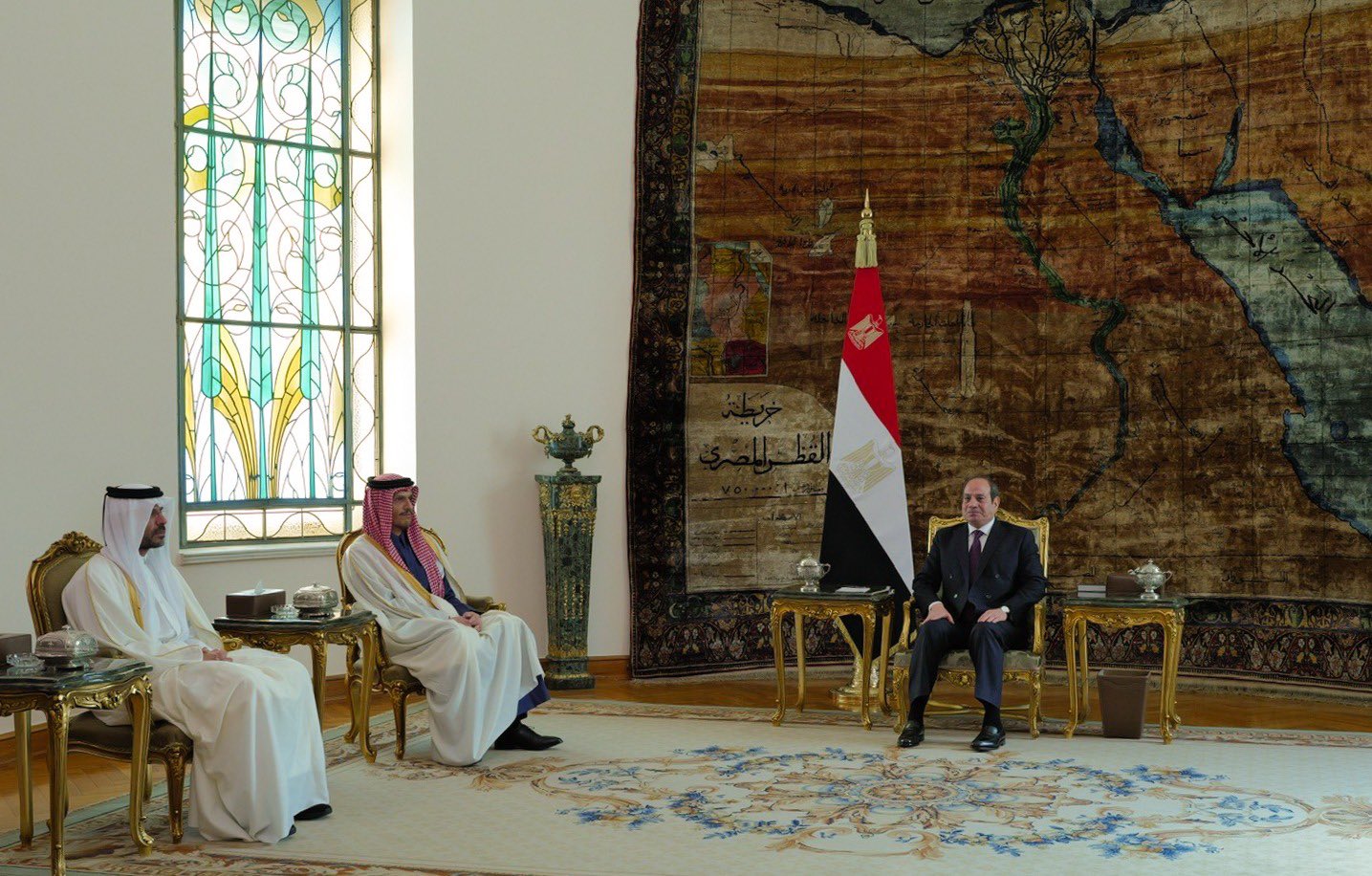U.S. President Joe Biden confirmed on Monday that Washington was proposing a six-week truce deal.
Qatar’s Prime Minister Sheikh Mohammed bin Abdulrahman Al-Thani and Egyptian President Abdel Fattah El Sisi discussed the latest efforts to reach a captives exchange and a halt in the fighting in Gaza on Tuesday in Cairo, Doha’s foreign ministry said in a statement.
The meeting between Sheikh Mohammed – who is also Qatar’s foreign minister – and Sisi dealt with “negotiations to reach a truce” and the expansion of the “cycle of violence in the region and its repercussions on regional and global security and stability.”
A separate statement by the Egyptian Presidency said the two sides “confirmed the extreme danger of escalating operations in Rafah in southern Gaza and warned of the serious consequences of such an action”.
“This is while emphasising the need for concerted international efforts to prevent the conflict from expanding and the increase of tension factors in the region,” the Egyptian statement added.
The meeting between Sheikh Mohammed and the Egyptian president took place on the sidelines of talks in Cairo between Qatar, Egypt, the CIA, and Israel’s Mossad.
Egyptian media reported that the meeting had aimed to discuss a ceasefire deal.
President Sisi also met CIA chief William Burns in Cairo, where “both sides confirmed the continuation of consultation and coordination to achieve a ceasefire, protect civilians, and effectuate the two-state solution”, the Egyptian Presidency said.
The talks have yet to reach a breakthrough, with Hamas saying that no delegation from its group was present at the meeting, an official from the Palestinian group told Al Jazeera.
“We are still awaiting the results of the ongoing meetings in Cairo, and communications are continuing with the mediators,” the official added.
The Associated Press separately reported that the talks continued on Wednesday, pointing to progress between Israel and Hamas towards another captive release deal and an end in the fighting.
U.S. President Joe Biden confirmed on Monday that Washington was working on a six-week pause deal.
“The United States is working on a hostage deal between Israel and Hamas, which would bring an immediate and sustained period of calm into Gaza for at least six weeks, which we could then take the time to build something more enduring,” Biden told the press in Washington.
Doha’s successful mediation last year, alongside Cairo, resulted in a temporary truce that lasted between November 24 and December 1.
The pause saw the release of at least 110 Israeli and foreign captives from Gaza as well as 240 Palestinian women and children from Israeli prisons, according to a Doha News tally.
Qatar is a major non-NATO U.S. ally and has hosted the Hamas political office since 2012 following Washington’s request to establish a channel of communication with the group.
Palestinian President Mahmoud Abbas visited the Gulf state on Monday where he discussed the Gaza ceasefire efforts with Qatar’s Amir Sheikh Tamim bin Hamad Al Thani.
His visit came a week after U.S. Secretary of State Antony Blinken visited the country for the third time since the start of the war in a scramble for a new deal.
Cautious optimism
Talks have stalled since the expiration of the previous deal as Israel intensified its attacks on Gaza while expanding its ground invasion to the south.
Signs of momentum in the talks emerged last month when representatives from Qatar, the U.S., Egypt, and Israel met in Paris.
Then on February 1, Qatar’s foreign ministry spokesperson Majed Al Ansari said Israel agreed to a proposed ceasefire and Doha had received an initial “positive confirmation” from Hamas.
The group added its demands on February 7, which included the withdrawal of Israeli forces and complete cessation of hostilities. Israel rejected those demands as it vowed to continue its war on Gaza, especially the south.
Negotiations are currently in a race against time as Israel plans a full-blown ground invasion of Rafah, where more than one million are taking shelter.
Israel initially declared the area to be a safer zone when it ordered approximately 1.1 million people to evacuate northern Gaza on October 12, 2023.
The invasion of densely-populated Rafah would be catastrophic and could create a major refugee crisis, a concern that Egypt has expressed. Reports said that Egypt started fortifying the shared Rafah Crossing, though authorities denied the claim.
Israeli Prime Minister Benjamin Netanyahu’s office had issued a statement on February 9 saying it was keen on “eliminating Hamas by leaving four Hamas battalions in Rafah.”
Netanyahu also ordered the Israeli military “to submit to the Cabinet a combined plan for evacuating the population and destroying the battalions.” Rafah has already been subjected to deadly bombardment since last week after Israel carried out deadly attacks in Khan Younis.
Qatar condemned Israel’s threats to invade Rafah on Saturday while urging the United Nations Security Council to prevent Israel from “committing genocide.”
US President Joe Biden said on Monday that “the major military operation in Rafah should not proceed without a credible plan for ensuring the safety and support of more than one million people sheltering there.”







